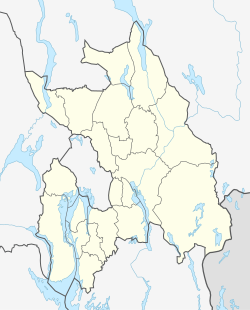Setskog is a village and a former municipality in Akershus county, Norway. It bordered Østfold county to the south, Hedmark county to the north and Sweden to the east.
Setskog | |
|---|---|
Village | |
 Setskog Senter | |
| Coordinates: 59°50′N 11°43′E / 59.833°N 11.717°E | |
| Country | Norway |
| Region | Østlandet |
| County | Akershus |
| Municipality | Aurskog-Høland |
| Time zone | UTC+01:00 (CET) |
| • Summer (DST) | UTC+02:00 (CEST) |
| Post Code | 1954 |

History
editSetskog was created by a split from Høland municipality on 1 January 1905. At that time Setskog had a population of 754. On 1 January 1966 Setskog merged with Nordre Høland, Søndre Høland and Aurskog to form the new municipality Aurskog-Høland. Prior to the merger Setskog had a population of 811.
Setskog is an old district name. The first element is the name of the lake Setten, the last element is skog meaning 'forest, woodland'. The meaning of the name Setten is unknown.
The Soot Canal, a timber transportation system constructed by Engebret Soot(1786-1859), went through Setskog from 1849 to 1938. It went from the lake Mortsjølungen on the border to Eidskog until the timber was transported on the Grasmobanen railroad, then through several lakes and a long narrow timbercanal, finally ending into the lake Setten where the timber was transported further south all the way to Halden.[1] Parts of the canalsystems, are now protected due to its historical value. An annual march, Sootkanalmarsjen, is held every summer, where hikers follow the entire length of the canal.
Goliat
editSetskog was once home to Norway's largest tree, a ca 250-year-old spruce. Some say the tree dated back to 1750 and it reached 47 meters in the air until wind broke the top reducing the height to 41.75 meters. Vandals cut the tree with a chainsaw in 2005, which left the tree badly damaged and eventually resulted in the tree dying and declining at a fast rate.[2] In 2010, the municipality decided to cut the dead tree down,[3] but the remains will serve as part of a tribute on the local soccer field.[4]
References
edit- ^ Bjørn Andresen, Sverre Eier, Svein Hjerpeset, red. (1987). «Gubben mot strømmen» Engebret Soot & Soot-kanalen (norsk). Eidskog: Eget forlag.
- ^ "Norges høyeste tre ødelagt". Retrieved 25 February 2015.
- ^ "Overlevde to verdenskriger-døde av hærverk". Retrieved 25 February 2015.
- ^ "Men kjempegrana skal leve videre". Archived from the original on 27 February 2015. Retrieved 25 February 2015.

